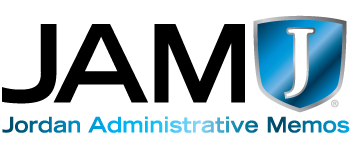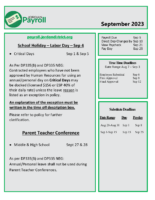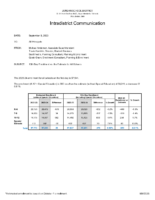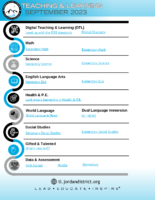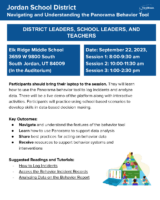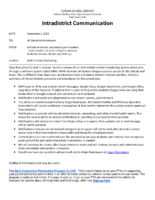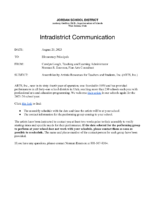Please see attached document.
Category: Elementary Info
Timeline for 2022-23 School Accountability Data Release
DATE:
Thursday, September 14, 2023
TO:
All School Administrators
FROM:
Carolyn Gough, Administrator of Teaching and Learning
Ben Jameson, Director of Evaluation, Research and Accountability
SUBJECT:
2022-23 Accountability Data
The Assessment & Accountability section of USBE released the following statement:
After releasing the Tableau 2023 State Education Research File (SERF) on August 25th one of our LEAs identified some missing student RISE test event records when comparing the Tableau SERF with reports available in the TIDE platform. We have been investigating these omitted student test records and discovered the source and scope of the event. The source of the event was the USBE incorrect use of a return file that included test event records that were in a “pause status” at the end of the testing window. This event effected 0.5 % of records or about 5000 tests. Applying the solution will require some rework and result in updates to the related (RISE) Data Gateway reports, a delay of the release of the 2023 school report card and school accountability determinations. Once the updated timelines are available, that information will be shared.
Since Jordan School District was impacted by this error, proficiency and growth scores currently in the Data Gateway will not be accurate. USBE plans to release accountability data using the following timeline:
- Sept. 16th – USBE will re-release proficiency and growth scores in the Data Gateway and SERF file. Evaluation, Research & Accountability uses data from the SERF file to update proficiency and growth data in RISE and Utah Aspire Plus dashboards on Tableau.
- Oct. 4-19 – School Accountability Report Cards will be securely released to school and district leaders to preview before the public release.
- Oct. 24 – School Accountability Report Cards will be released to the public.
- Oct. 27 – TSI and CSI school designations will be released.
Please contact Ben Jameson in Evaluation, Research & Accountability with questions.
Important Payroll Information for September 2023
Please see the document below.
2023-24 10th Day Enrollment vs. the Estimate
DATE:
September 8, 2023
TO:
All Principals
FROM:
Michael Anderson, Associate Superintendent
Travis Hamblin, Director, Student Services
Scott Festin, Planning Consultant, Planning & Enrollment
Caleb Olson, Enrollment Consultant, Planning & Enrollment
SUBJECT:
10th Day Enrollment vs. the Estimate for All Schools
See attached memo. Please note that with the release of 10th day numbers, enrollment information on school dashboards will only be updated monthly for the remainder of the year. Schools should anticipate a "Done.0" allocation memo shortly.
What’s the Latest with Teaching & Learning?
Check out the attached flyer for the latest updates from Teaching & Learning for September. Learn Tips and Tricks, Sign Up for Upcoming PD, and Learn about Important Updates from the T & L team.
Navigating and Understanding the Panorama Behavior Tool
Please see the attached document.
School Counselor Trainings for September and October 2023
DATE:
September 5, 2023
TO:
All Elementary Principals
All Secondary Principals
FROM:
Mike Anderson, Associate Superintendent
Jill Durrant, Administrator of Elementary Schools
Lisa Robinson, Administrator of Elementary Schools
April Gaydosh, Administrator of Elementary Schools
Becky Gerber, Administrator of Elementary Schools
Travis Hamblin, Director, Student Services
Stacee Worthen, Counselor Consultant
SUBJECT:
September/October 2023 School Counselor Trainings
See the attached memo for the details.
2023-24 Annual Nutrition Services Pan Sale
Take a look at the attached flyer!
State Required Bus Evacuations and School Bus Safety 2023-24
DATE:
September 1, 2023
TO:
All Jordan School District Principals (with bus route students)
FROM:
Scott Thomas, Administrator of Auxiliary Services
Paul Bergera, Director of Transportation
Kathy Jones, Transportation Trainer/Risk Coordinator
SUBJECT:
State Required Bus Evacuations and School Bus Safety 2023-2024
State required semi-annual school bus evacuations have been scheduled for this fall. This applies to those students that ride the bus daily to and from school.
The evacuations will be conducted during the week of:
Monday, September 11 through Friday, September 15, 2023
Your school’s regular bus drivers will perform this evacuation as they drop your students off in the morning, one day during that week. This drill will take place at the school and within the students’ regular bus drop off/pick up zone. All professional school bus drivers that transport students are required to perform evacuation procedures in case of an emergency. Bus evacuation will be through the rear door, side door, front door or any combination of the three. Students will then, under the direction and supervision of the bus driver, evacuate and meet in a safe place approximately 100 feet away from the bus.
Your assistance is welcome but not mandatory to complete this required evacuation drill quickly, safely and effectively.
We appreciate all you do to help us safely transport your students.
2023-24 Ballet West Student In-Theater Performances
DATE:
August 31, 2023
TO:
Secondary Principals
Elementary Principals
FROM:
Carolyn Gough, Administrator, Teaching and Learning
Norman Emerson, Fine Arts Consultant
SUBJECT:
Ballet West 2023-24 Student In-Theater Presentations
Ballet West is again providing free presentations of the following ballets in the Capitol Theater:
- Dracula (Grades 5-12)
- The Firebird (Grades 1-12)
- The Nutcracker (Grades K-12, One and Two-Hour Presentation Available)
- Swan Lake (Grades 1-12)
- Fairy Tale Theater (Grades 1-12)
Each program begins with an educational introduction and is followed by a portion of the repertoire currently being performed for the general public.
The link to Ballet West’s website with further information (including dates and times) on all of the student performances is Ballet West Student In-Theatre Performances .
If any of your teachers are interested in having their classes attend any of the performances, please have them contact Susy Peterson at susanlyn.peterson@jordandistrict.org or 801-567-8296. Seating is limited and performance slots will be filled on a first come first serve basis.
Please be aware that transportation costs must be covered by individual schools. Neither Ballet West nor the Teaching and Learning Department will be covering the costs of transportation.
Founder’s Month and Constitution Day – September 2023
September has been designated as Founder’s Month by the Utah State Legislature. The bill states that public schools are encouraged to recognize and observe this occasion. You can do this through programs and teaching in class about the Founding Fathers and important founding documents. September 17th is also Constitution Day and all public schools who receive federal funding are asked to observe this day.
You may have received a Founder’s Month Curriculum in the mail. Please remember that all curriculum should be approved before use. It will not be mailed directly to you. Teachers have access to materials on the district website: Social Studies
Jordan District currently has a team of teachers K-6, who have been asked by USBE to create curriculum for the whole state on the new elementary social studies standards. These teachers have been working on great lessons that teachers can use for Founder’s Month and Constitution Day that are grade level appropriate.
We want to make sure that we are following all state and federal mandates and guidelines. You will be notified of these important dates through JAM and teachers will receive notifications through JEM. When teachers have questions, please direct them to the district website or you can contact Kaye Rizzuto, JSD Social Studies Consultant at kaye.rizzuto@jordandistrict.org (801) 567-8320.
Record of August 15, 2023 Professional Learning Day Attendees
DATE:
Thursday, August 31, 2023
TO:
All School Administrators
FROM:
Carolyn Gough, Administrator of Teaching and Learning
Ben Jameson, Director of Evaluation, Research and Accountability
SUBJECT:
Record of August 15th Professional Learning Day Attendees
School administrators may access a Tableau dashboard that contains a record of all educators who signed in using the QR code for the August 15th professional learning day. The dashboard may be accessed here. Administrators may also filter the list by conference location.
For questions about this dashboard, please refer to Ben Jameson in Evaluation, Research & Accountability.
BARK Content Monitoring
DATE:
September 1, 2023
TO:
All School Administrators
FROM:
Michael Anderson, Associate Superintendent
Travis Hamblin, Director of Student Services
McKinley Withers, Health and Wellness
SUBJECT:
BARK Content Monitoring
Now that school is back in session, here is a review of our districtwide content monitoring system which runs through a software system called BARK. BARK monitors all student Google accounts across all JSD schools and levels. This is different from iboss and Lanschool and does not detect student internet searches. Here is a summary of the notification protocols and procedures for this school year.
- BARK uses an AI to scan student Gmail messages, Google chats, Google documents, and Google slides, regardless of the device or IP address that is used. As long as the student is logged into and using their Jordan District Google account, the content can be monitored.
- Notifications and alerts are categorized as non-severe, severe, and imminent.
- The alerts are monitored primarily by Angie Rasmussen, JSD Student Safety and Wellness Some alerts will require additional investigation at that level to determine the context and to weed out false positives.
- Notifications to schools will include administration, counseling, and other mental health teams. This allows for several adults to receive notifications in case they are somewhat time sensitive.
- Notifications will come in an email from Angie unless it is urgent, then a phone call or text message will be communicated.
- Notifications that are not considered emergencies or urgent will not be sent after 3pm on a school day to ensure that intervention is reasonable and timely for school personnel.
- Content alerts are not monitored over the weekend or on days students don’t attend, but emergency alerts will still be sent when immediate intervention is needed.
- We will continue to receive after hours imminent alerts and will continue to work with administrators when immediate intervention is required.
- Should you have any questions please reach out to Angie Rasmussen at angie.rasmussen@jordandistrict.org.
Additional information that may be useful:
The Bark Community Partnership Program is LIVE . This program helps serve your PTA's in supporting your parent and family communities in an effort to better protect our children online (and in the real world). The program is optional and is free. It is easy to sign up. If you or your PTA are interested in this additional resource for parents about all things kids and technology, click here Sign-up Here
Student Injuries – Updated Process
Thank you for your patience while the State of Utah updates their process to report student injuries. The attached will assist you in getting your UtahID set up and completing the Administration Form to get your access to REDCap. Once you log into the REDCap site you will "Add new record" and complete the necessary fields to report a student injury. There are very helpful video tutorials on the site for additional training.
Student Injury Report in REDCap
Step 1:
Create a UtahID at id.utah.gov. Instructions on how to create one and a short video tutorial can be found above, or on the UtahID Account Creation page. A verification email will be sent.
Please note that using the user's professional email address is the preferred method. If they opt to use a personal email account, a justification note is required from Project Owners stating the reasons for doing so.
Multi-Factor Authentication (MFA) will be required for all new UtahID public user accounts. New users will have the option to have the MFA code sent by email or SMS text message. Please note, when a user first registers, the only option available will be email since that is the available method listed on the account until the user adds a mobile phone number to their profile in id.utah.gov.
Open the verification email and enter the code into the field provided on the UtahID creation webpage.
Finish setting up UtahID after numerical code is entered.
Send an email to: Vanonda Kern, Project Owner, studentinjury@utah.gov to let them know you have created a UtahID. The Project Owner will reply to your email to let you know you can move on. You will not be able to access REDCap to create an account until you are notified by the Project Owner.
Step 2:
Fill out the Administrative Form. The form will be received by the Project Owner and information from the form will be reviewed and entered in for REDCap approval.
ARTS, Inc. Performance Schedule — 2023-24
DATE:
August 25, 2023
TO:
Elementary Principals
FROM:
Carolyn Gough, Teaching and Learning Administrator
Norman R. Emerson, Fine Arts Consultant
SUBJECT:
Assemblies by Artistic Resources for Teachers and Students, Inc. (ARTS, Inc.)
ARTS, Inc., now in its sixty-fourth year of operation, was founded in 1959 and has provided performances in all forty-one school districts in Utah, reaching more than 250 schools each year with professional arts and education programming. We welcome their artists in our schools again for the 2023-24 school year.
Click this link to find:
- The assembly schedule with the date and time the artists will be at your school.
- The contact information for the performing group coming to your school.
The artists have been instructed to contact you at least two weeks prior to their assembly to verify starting times and specific needs for their performance. If the date selected for the performing group to perform at your school does not work with your schedule, please contact them as soon as possible to reschedule. The name and phone number of the contact person for each group have been provided.
If you have any questions, please contact Norman Emerson at 801-567-8364.
Important Updates to the Mental Health Access Program
DATE:
August 24, 2023
TO:
All School Administrators
FROM:
Michael Anderson, Associate Superintendent
Travis Hamblin, Director of Student Services
McKinley Withers, Health and Wellness
SUBJECT:
Important updates to the Mental Health Access Program
Please note the following important updates regarding the Mental Health Access Program. In order to promote the sustainability of this program, given limited funds, it’s essential that all administrators review the following changes:
- There is no longer a "MHAP referral" form. This is now a "Request to Screen a Family for Community Mental Health Resources.” The new form is attached to this memo and can be found at wellness.jordandistrict.org. Rather than "referring" families, we want to shift our language to be "recommended for screening." This change will allow better allocation of our limited resources to the students and families who most need it. Our District’s clinical team has been trained on a screening process to support this change and make a decision regarding a family’s options.
- What this means at the secondary level: if you are considering a family for community mental health services such as MHAP, please work with your school's assigned clinical support specialist to conduct a screening. Because funds are limited, your school’s clinician has been trained to tease out other community mental health options. It’s best that other staff members do not promise grant funds that may not be available or needed without consulting the clinical support specialist and following the screening process.
- What this means at the elementary level: if you are considering a family for community mental health services such as MHAP, please fill out the attached form and email it to Kevin Mossel (kevin.mossel@jordandistrict.org). He will call, set up a meeting, and meet with the student and/or parent to screen and assess them for community resources and services. If MHAP is recommended at this screening, the clinical support specialist who conducted the screening will proceed with having the parent sign the MHAP consent form and help them access a provider that best fits their needs by authorizing and facilitating a referral. The clinical support specialist will then report back to you about what was recommended for the family.
- With limited funds it’s essential to manage expectations we may inadvertently be setting when communicating with parents or caregivers about their options. It’s best not to promise “free therapy” and instead use language such as "the District has a program where you can be screened for community mental health services and recommendations will be provided to help you and your student." Not every family may need financial help through MHAP and in some situation’s outpatient therapy may not be the best fit for a family’s needs.
- We are no longer offering students "8 sessions" or "$800 of MHAP funds.” Please do not say this to a parent as it will not be accurate. If you opt to explain MHAP to a parent, it would be more accurate to say “we have a resource in the community that might help pay for some initial mental health services and get your student started quickly.” Then, the extent of the referral can be explained after a family has been screened and the recommendation was made after a more thorough review of available options.
Since its inception in 2020, over 2000 MHAP referrals have been made. We acknowledge your vital role in supporting students as they work to improve their mental health. If you have questions or issues with these changes, please contact McKinley Withers, Travis Hamblin, or Kevin Mossel in Student Services.
Clinical Support Specialist Training Dates
DATE:
August 24, 2023
TO:
All School Administrators
FROM:
Travis Hamblin, Director of Student Services
McKinley Withers, Health and Wellness Consultant
SUBJECT:
2023-2024 Clinical Support Specialist Calendar
Please be aware of the Clinical Support Specialist (CSS) meeting dates listed below. It is essential that school-based clinicians are allowed to prioritize these meetings to be current on best-practices relevant to their role.
CSS Team Trainings (1pm-3pm)
- October 6, 2023
- January 5, 2024
- February 23, 2024
- April 5, 2024
PLC Meetings (730am-830am)
Purpose of PLC’s: Case staffing and professional consultation
- September 15, 2023
- October 13, 2023
- November 10,2023
- December 8, 2023
- January 19, 2024
- March 8, 2024
- April 19, 2024
- May 10, 2024
Should you have any questions please reach out to McKinley Withers at mckinley.withers@jordandistrict.org
EDI Supports
A reminder that you have resources when supporting students with diverse needs. Please view this video to hear how the Offices of Equity & Compliance can assist you. We recommend that you show this video in your faculty meeting.
The Office of Equity & Compliance
Parents Can Learn English & Get School Support at the Herriman Family Engagement Center
The Herriman Family Engagement Center is now open. Language & Culture Services is excited to have parents of ML and newcomer students come and get support.
English classes are offered on Mondays and Wednesdays from 5-8 p.m. and on Tuesdays and Thursdays from 9-11 a.m.
Please feel free to print these flyers and post them in your school.
Get Vivi Pro at a Significant Discount!
We have been notified that the Vivi Lite has been sunset and is no longer available for purchase. As a result, Vivi is willing to upgrade any Vivi Lite purchased by our district to the Vivi Pro. Our current pricing is $399 for Vivi Lite and $499 for Vivi Pro. Retail price is $599. This pricing will expire on October 18, 2023. This means that if you purchase a Vivi Lite for $399 you will get the Vivi Pro at a price that has been discounted by $200! For additional information regarding Vivi, please reference the JAM dated November 3, 2022.
